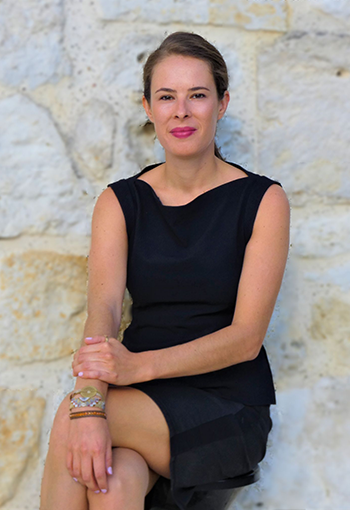Anne de Bortoli, rewarded globe-trotter

She has a name as beautiful as that of an opera singer, a head carriage worthy of a prima ballerina and already a brilliant and promising career. However, Anne de Bortoli does not work in the artistic field but in the environment and mobility. Fields that the young woman likes to combine by teleworking in her native Lot-et-Garonne since the confinement.
This multi-graduate and multi-awarded woman has been hired as a technical engineer-researcher for the environment at Eurovia, VINCI's road, rail and airport construction subsidiary. It's a job that's rather new in France, but also in the world. "My job is to develop the practice and analysis of the life cycle in the company's activities. The idea is to improve the environmental footprint of the road industry at the level of materials and technologies," explains Anne de Bortoli.
Joining the group seemed natural to her since it was the sponsor of her research work during her years at the École des Ponts, from which she graduated and where she also teaches. Her current position is in line with her previous work, notably at the City Mobility Transport Laboratory (LVMT), her thesis on sustainable road maintenance and its youthful desires. Attracted by both literature and chemistry, the student finally chose a path that would lead her to the environment and research by joining the École des Ingénieurs de la Ville de Paris. "I was eager to contribute to the improvement of our lifestyles," she says.
Reducing mobility: a dilemma
Passionate, Anne de Bortoli could talk for a long time about her work, professional projects and travel... From Berkeley in California to Taiwan in Asia, via Patras, Greece, from internships to conferences, the one who has visited about 50 countries has put a stop to all the distant missions, but not only because of the health crisis. "In 2017, while preparing a course for the Federal Polytechnic School of Lausanne, Switzerland, on the ecological footprint of transportation, I realized that I was well over the threshold of 10,000 km per year by plane, so I was exceeding my carbon budget! I was extremely disappointed because my daily lifestyle remains very low-carbon," she says.
Despite her awareness, Anne de Bortoli is still hesitant: "It is difficult to deprive oneself, or even penalize oneself as a young researcher, by not attending international academic exchanges: these interactions are important for the development of our knowledge and our work, and are a source of many opportunities. Voluntarily reducing one's mobility is a real dilemma. Some friends have made this decision: they now only take the train for long trips.
For the moment, no hesitation, the Covid-19 crisis has forced the young woman to stay in France when she was supposed to spend the year 2020 at MIT and many international events cannot be held. Thus, last May, the specialist in environmental assessment of transport had to participate remotely in the award ceremony of the International Transport Forum - OECD (ITF), initially scheduled in Germany, where she was awarded the "Young Researcher of the Year" prize for her study on the environmental impact of shared electric scooters in Paris, conducted as part of the ORNISIM project at the University of Patras. Responding to the polemics and debates on this new mode of travel, the researcher's work highlights the current pitfalls but also the environmental potential of the use of scooters in the urban landscape.
This is not Anne de Bortoli's first award. She was doubly distinguished in 2019 with the "Young professionals award" as well as the "Charles Parey" prize, for her doctoral work by the World Road Association.
Along the way, the globetrotter is gradually making progress on the road to recognition. She does not travel by scooter. This sportswoman and dreamer prefers to ride a horse but uses public transport more easily for her journeys. The demonstration that the life cycle can be virtuous.
How do scooters impact climate change?
+13,000 tons of CO2 equivalent emitted over one year due to the arrival of shared scooters, because of their short lifespan (and therefore the impact of their manufacture, mainly their aluminum frame and batteries) and fleet management (diesel vans collecting the scooters). It is difficult to make scooters "competitive" from an environmental point of view because they replace the metro and RER at 60%, walking and cycling at 20%, which are very low carbon modes. On the other hand, scooters could be interesting from an environmental point of view in countries with a more carbon-intensive electricity mix, such as Germany, Poland, China and certain American states, and especially where they replace more emissive modes of transport: the private car, or even the bus.
Awards
2020 - "Young Researcher of the Year" Award from the International Transport Forum - OECD
2019 - "Young professionals" award, for an author under 35 years old, selected internationally by the World Road Association
2019 - "Charles Parey" Award: Gold Medal for Road Innovation (awarded every 4 years by the French committee of the World Road Association) (ex-aequo)
2019 - Nominated for the Ecole des Ponts ParisTech thesis prize
2011 - Research grant from the Taiwanese government as part of the "Research and Practical Training in Taiwan" program
Chinese portrait
If you were a city? Bordeaux.
If you were a place? A forest.
If you were a means of transportation? A Dutch bicycle.
If you were a car? The Tesla!
If you were an invention? The green hydrogen engine
If you were a discovery? Teleportation.
If you were an energy source? Wood.
If you were a means of communication? Mail.
If you were a robot? Wall-E.